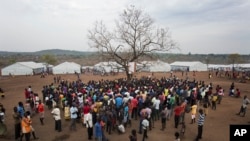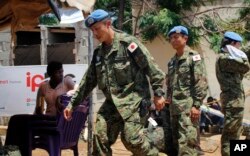On Africa Day Thursday, about 300 young African leaders appealed to African heads of state to rescue South Sudan's 2015 peace agreement.
The Archbishop Tutu fellows said in a letter to the leaders that the conflict in South Sudan poses serious national security threats to neighboring countries.
"We, the Archbishop Tutu Fellows ['Tutu Fellows'], have been following the events unfolding in South Sudan with great dismay. We felt it incumbent upon ourselves to write and urge you, as neighbors and key members of regional blocs, to leverage your relationships with political and military leaders on all sides of the conflict in South Sudan to revive a political process and chart a way forward for the implementation of the August 2015 peace agreement," reads the letter addressed to "Your Excellencies," the presidents of Uganda, Kenya, South Africa, Egypt, Ethiopia, Tanzania, Rwanda, Nigeria, Namibia and Sudan.
Problem for all of Africa
Jackie Chimhanzi, chief executive officer for the African Leadership Institute in Johannesburg, South Africa, said South Sudan's conflict has become an Africa-wide problem.
"We felt that we needed to compel our leaders to act because we can talk about a peaceful Africa in 2063, yet we are not acting on South Sudan now, today," Chimhanzi said.
She said they purposely wrote the letter to the heads of neighboring countries because they have more at stake, adding, "the atrocities, and the war, actually those things threaten to spill over into neighboring countries."
Chimhanzi pointed out a number of Kenyan banks have had to shut down branches in South Sudan due to the insecurity, saying it's in their interest to work for peace in South Sudan.
The fellows urge the heads of state to deny South Sudan's political leaders access to amenities in their countries until they adhere to the peace deal.
Next generation of leaders
Chimhanzi said the Tutu fellows see themselves as Africa's next generation of leaders and therefore believe it's not right that "our current leaders continue to not hold each other to account, to support behavior that they know are not correct."
"It's time to be honest," Chimhanzi said, and to "speak to power, because such behavior is really not progressing the continent.
"We are watching 3.9 [million] people being killed, 4.9 [million] people are food insecure right now, there's famine, women and children are being raped; it cannot be right."
Chimhanzi calls the letter to the heads of state "a call to action."








